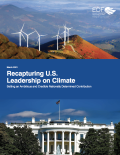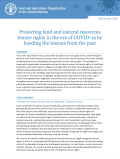
This report demonstrates how achieving at least 50 percent emissions reductions is achievable – and that charting an ambitious path on climate is vital for growing a stronger and more equitable, clean U.S. economy.

This report aims to provide guidance and insights to policy-makers, regulators, and affected stakeholders on how evaluate and plan for how to protect the tenure rights of small food producers, particularly women, indigenous peoples (IPs) and other vulnerable groups, to avoid exacerbating the negative effects of the existing health crisis.
This report lays out a strategy for putting Americans back to work building a vibrant 21st century U.S. economy based on advanced technologies, good jobs, clean energy, climate safety, and economic security.
To electrify ridehailing vehicles at scale, key industry stakeholders must collaborate. Analyzing 100 million miles of actual electric and gasoline ridehailing vehicle data, this report offers actionable recommendations for stakeholders to address three key barriers to implementation. Rocky Mountain Institute collaborated with General Motors to better understand the challenges and opportunities of transportation network company (TNC) electrification by evaluating a year of actual operational data—of both EVs and internal combustion engine (ICE) vehicles operating in TNC services.

The U.S. energy sector’s shift to clean energy is creating a once-in-a-generation opportunity to build a more just, equitable and sustainable society. This report recommends the clean energy industry adopt five best practices to help ensure that the transition to clean energy in the U.S.
